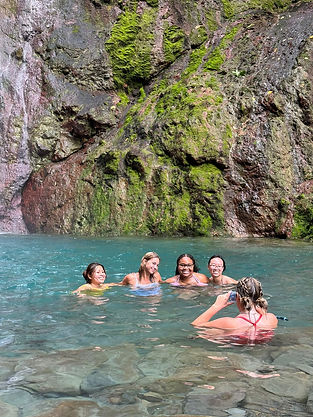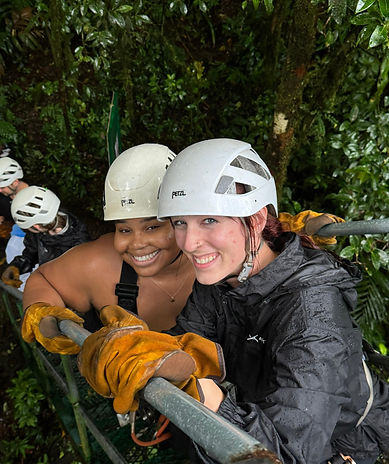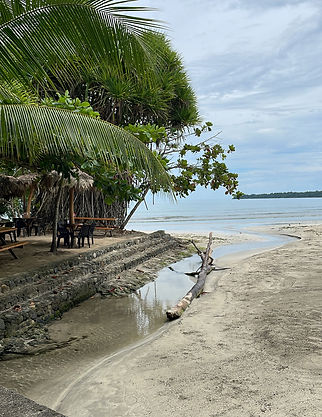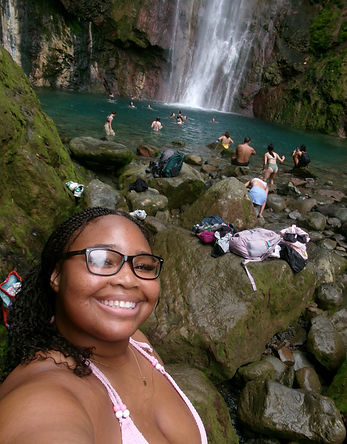Iboro Okpok
Heredia, Costa Rica
For as long as I can remember, Spanish has been a part of my academic journey. Over the past ten years, I immersed myself in learning the language, applying it in different courses at Clemson, and constantly looking for ways to improve. Before leaving for my study abroad program in Costa Rica, my primary goal was to sharpen my Spanish skills through full immersion, moving beyond textbook knowledge to communicate more naturally with native speakers. I wanted to learn the language in a way that felt effortless—picking up colloquial expressions, understanding cultural nuances, and building confidence in real-life conversations.
Before embarking on my journey, I had the opportunity to work as a Physical Therapy Technician, where I served as a bilingual employee. This experience allowed me to practice my Spanish daily with native speakers, helping me strengthen my listening skills and gain insight into different dialects and speech patterns. While I felt somewhat prepared, I knew there was still so much more to learn, and I was eager to fully immerse myself in Costa Rican culture.
Once I arrived in Costa Rica, my daily life changed drastically. Living with a host family and speaking Spanish every day was both exciting and challenging. I quickly realized that textbook Spanish and conversational Spanish were two very different things. Costa Ricans (los ticos) use unique sayings and expressions that I had never encountered before, and I had to adapt to these new phrases to communicate more naturally. In addition to adjusting linguistically, I had to embrace a different way of life. Meal times were different, I relied on public transportation and walking instead of driving everywhere, and I left behind America’s fast food culture. Despite these adjustments, I grew to love the rhythm of daily life in Costa Rica. One of my favorite aspects of their culture was their love of coffee—rich, bold, and always prepared in a traditional way that felt like an art form.
Beyond language and daily life, my classes in Costa Rica deepened my understanding of Latin American history. Through literature, music, and discussions with my professors and peers, I gained a broader perspective on the region’s culture and history. Learning about Latin America through these mediums helped me connect more deeply with the country I was living in and appreciate its people even more.
One of the most rewarding parts of my experience was volunteering to teach English to children. Not only was I able to help them learn, but I also found myself reflecting on my own journey with Spanish. It was a full-circle moment—sharing the techniques and strategies that had helped me learn a second language while watching young students take their first steps toward fluency. Language is such a powerful tool for connection, and I felt grateful to be part of that exchange.
I was also fortunate enough to celebrate Costa Rica’s Independence Day while abroad. Seeing the way Costa Ricans take pride in their country was inspiring. The parades, traditional music, and national pride were unlike anything I had experienced before. It was a beautiful reminder of how culture and language are deeply intertwined.
By the end of my study abroad experience, my Spanish had improved tremendously. I became more confident in my ability to hold conversations, understand native speakers, and even use the local expressions I had picked up. More importantly, I made meaningful connections with people—both in Costa Rica and now back in the United States. Since returning, I’ve found myself naturally incorporating what I learned into my daily life. Whether it’s the more complex grammatical structures of Spanish, a greater appreciation for public transportation, or simply a new perspective on cultural exchange, my experience in Costa Rica has left a lasting impact.
I never expected to feel so changed upon my return, but I now realize how much confidence I have gained—not just in my language skills, but in my ability to adapt, connect, and grow. One of the most rewarding aspects has been applying my improved Spanish skills in my job. Now, when I speak with Spanish-speaking patients, I can communicate with them on a deeper level, making them feel more comfortable and understood.
One aspect of Costa Rican culture that left a lasting impression on me was the deep-rooted value placed on natural remedies, especially the use of medicinal teas, alongside their commitment to accessible and free healthcare for all citizens. It was remarkable to see how everyday ailments were often treated with herbal infusions passed down through generations, and how this holistic approach was seamlessly integrated into their healthcare philosophy. This, paired with a healthcare system that prioritizes prevention and access over profit, starkly contrasted with the often complex and costly nature of medical care in the United States. Witnessing this balance of tradition and accessibility reshaped how I view our own healthcare practices—highlighting the potential for blending modern medicine with time-honored natural approaches. As a future physician assistant, I hope to carry these lessons into my practice by advocating for equitable care and being open to integrative, culturally respectful treatment options that consider the full spectrum of a patient’s wellbeing.
Studying abroad in Costa Rica was one of the most transformative experiences of my life. It challenged me, changed me, and gave me a newfound confidence in my Spanish abilities. More than anything, it reminded me of the power of language—not just as a tool for communication, but as a bridge to understanding and connection across cultures.



